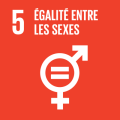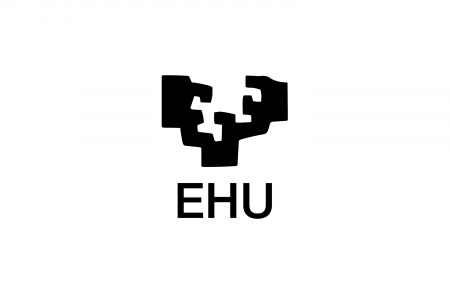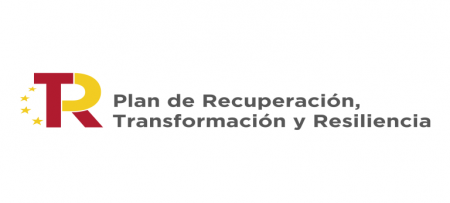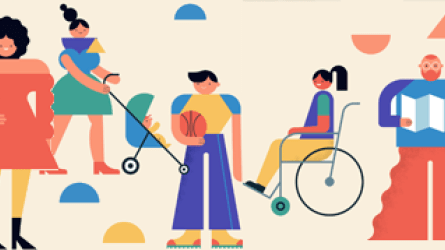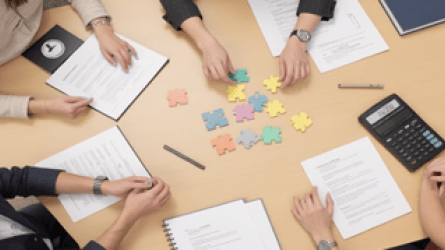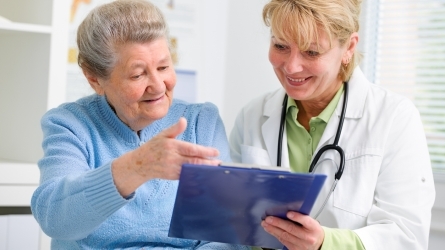
Communication for health and education professionals (online and optional face-to-face session)
Improve communication with students, patients and in your clinical and educational environment. Practising and watching videos will help you to better manage your time and stress.
Description
This course is designed to strengthen the communication skills of health and education professionals, promoting more effective, empathetic and inclusive communication. Throughout five modules, key aspects such as social and emotional skills in communication, assertiveness, negotiation and motivational interviewing will be worked on. Verbal and non-verbal communication, active listening and empathy will also be addressed, as well as strategies for managing difficult situations, including the communication of bad news.
From an inclusive perspective and with a gender focus, the course will promote communication free of stereotypes, based on respect and equity. Through interactive dynamics, simulations and reflection exercises, participants will strengthen their communication skills, learning to manage conflicts, transmit messages with clarity and emotionally accompany those who need it in different health care contexts.
The course combines online methodologies and an optional face-to-face session.
Objectives
Strengthen the communication skills of health and education professionals, promoting more effective, empathetic and inclusive communication.
Learning outcomes and type of achievement
1.Development of effective communication skills:
- Participants will be able to demonstrate advanced skills in verbal and non-verbal communication in clinical situations, such as patient consultations, collaborations with colleagues and clinical case presentations.
2.Patient relationship management:
- Participants will learn how to establish an empathetic and professional relationship with patients, addressing their concerns and needs effectively during consultations and follow-up.
3.Management of difficult situations:
- Participants will learn how to apply communication strategies to manage difficult situations, such as the dissemination of bad news or conflict resolution in the clinical setting.
4. Adapting messages to different audiences:
- Participants will learn how to adapt their communication to different audiences, such as patients, family members and colleagues, adjusting language and approach according to the context.
5.Evaluation and Constructive Feedback:
- Participants will be able to provide and receive constructive feedback in the clinical context, using effective techniques to evaluate and improve communication with patients and colleagues.
Evaluation of Achievements
To evaluate these achievements, several tools can be used:
- Assessments and Questionnaires: To measure acquired knowledge and the ability to apply communication techniques.
- Observation and Feedback: Assessments during practical activities and simulations to observe the application of skills in real or simulated contexts.
- Self-Assessment and Reflection: Participants' self-assessments and reflections on their own development and implementation of the techniques learned in their daily practice.
- Satisfaction and Outcome Surveys: Surveys to assess participants' perceptions of the effectiveness of the course and the impact on their professional performance.
These achievements help to ensure that health professionals not only acquire knowledge, but also apply it effectively in their daily practice, improving the quality of care and collaboration in the clinical setting.
Access prerequisites and admission criteria
The course is mainly online but there is the opportunity to receive a face-to-face session.
Professional experience in the health and education sector.
Participants may be healthcare professionals, such as doctors, nurses, psychologists, therapists, administrators or other professionals working directly with patients or clients. Employment counsellors or secondary school and university teachers will benefit from this course.
o Requirement: Participants must have computer and audio (camera is recommended), as well as basic skills in using computers and digital platforms.
o Required age: between 25 and 64 years old.
Level of learning experience according to EQF European Qualifications Framework
In the Spanish Qualifications Framework for Lifelong Learning (MECU) people with a level 1 or higher could be accepted. Any person who according to EQF: (European Qualifications Framework) has primary education can be accepted in the course if he/she passes the interview.
ESCO, European Skills, Competences, Qualifications and Occupations competency frameworks
Within the ESCO classification of skills and competences of the European Union, the following would be the corresponding ones related to this course
Transversal competences
Social and communication skills and competences
Skills and competences related to the ability to interact with others in a positive and productive way. This is demonstrated by communicating ideas in an effective and empathetic manner, coordinating one's own goals and actions with those of others, acting in structured, value-driven ways, caring for the well-being and progress of others and providing leadership.
Competences
S1. communication, collaboration and creativity
Communicate, collaborate, liaise and negotiate with others, develop solutions to problems, create plans or specifications for the design of objects and systems, compose texts or music, perform to entertain an audience and impart knowledge to others.
S3. providing assistance and care
Providing assistance, care, attention, service and support to people, and ensuring compliance with rules, regulations, guidelines or laws.
Evaluation tests
- Written evaluations: 1. Multiple Choice Examinations
- Written evaluations: 2. Evidence which is considered true/false
- Oral evaluations: 4. Role-playing
- Practical evaluations: 4. Tasks: (Practical exercises)
- Group evaluations: 3. Peer evaluation
- Thought-evaluations: 1. Written Reflections
Activity directed to
- All public
- Teachers
- Professionals
Methodology
Each module has its own evaluation methodology, to obtain the certificate of successful completion of the course, it will be necessary:
- Participate in the discussion forums: spaces for questions, debates and group reflection.
- To complete the Interactive Exercises: Practical activities to reinforce learning.
- Pass the Online Assessments: Quizzes and self-assessment activities.
Organised by
In collaboration with
Directors

Virginia Guillen Cañas
Facultad de Medicina y Enfermería
Degree in Psychology and PhD in Neurosciences on Eating Disorders. Experience in Evidence-Based Methodology - Iberoamerican Cochrane Centre aimed at health prevention and communication of health professionals. Associate Professor of Neurosciences at the EHU/UPV, teaching Psychology in Medicine, Dentistry and Physiotherapy. Researcher at Osteba and the Mental Health Network of Bizkaia, with publications on developmental disorders, mental health and evaluation of interventions. She has directed theses on pain perception, rehabilitation of the body schema and doping or suicide detection using voice and speech parameters. With experience in drug addiction prevention programmes, she has developed communication strategies to strengthen skills and resilience. She has been a trainer on gender equality and has disseminated information to promote mental health. She has participated in awareness-raising projects on first psychotic episodes, chronicity and suicide. ORCID: https://ekoizpen-zientifikoa.ehu.eus/investigadores/125775/publicaciones
Speakers

Virginia Guillen Cañas
Facultad de Medicina y Enfermería
Degree in Psychology and PhD in Neurosciences on Eating Disorders. Experience in Evidence-Based Methodology - Iberoamerican Cochrane Centre aimed at health prevention and communication of health professionals. Associate Professor of Neurosciences at the EHU/UPV, teaching Psychology in Medicine, Dentistry and Physiotherapy. Researcher at Osteba and the Mental Health Network of Bizkaia, with publications on developmental disorders, mental health and evaluation of interventions. She has directed theses on pain perception, rehabilitation of the body schema and doping or suicide detection using voice and speech parameters. With experience in drug addiction prevention programmes, she has developed communication strategies to strengthen skills and resilience. She has been a trainer on gender equality and has disseminated information to promote mental health. She has participated in awareness-raising projects on first psychotic episodes, chronicity and suicide. ORCID: https://ekoizpen-zientifikoa.ehu.eus/investigadores/125775/publicaciones
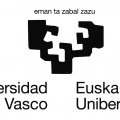
Josune Martin Corral
PhD in Psychology, with two degrees, Psychology and Pedagogy, studying for more than two years at a German University. She has completed complementary training with a Master's degree in Psycho-oncology and in research and with the Research Training Programme for Hospital Health Personnel. She is accredited as an Expert in Research in Health Services and Chronic Diseases by the University of Alcalá and as an Expert Psychologist in Psycho-oncology and/or Psychology in Palliative Care. She has positive accreditation from ANECA for the figures of PUP, PCD and PAD. In the clinical area as a Health Psychologist, she is Coordinator of the Chronic Pain and Fibromyalgia Programme at IMQ AMSA. In the research area, she works in the Research Unit of the Galdakao-Usansolo Hospital. She is co-investigator in several projects with national and regional funding. She is also a member of the Research Network on Chronicity, Primary Care and Prevention and Health Promotion (RICAPPS). She is first author of publications in high impact journals (Q1 and Q2), as well as author of several book chapters and several articles in national journals of medicine and psychiatry.

Miren Agurtzane Ortiz Jauregui
UPV/EHU
Psychiatrist and doctor in Neurosciences. Master in Mental Health and Expert in Group Analysis. Professor of Neurosciences-Psychiatry at UPV/EHU. Professor of the Master's Degree in Healthy Aging and Quality of Life Academic Director of the Master's Degree in Comprehensive Care in Palliative Care Vice Dean of the Faculty of Medicine and Nursing (2004-2021). President of the Bilbao Academy of Medical Sciences (ACMB) and member of its Mental Health Section. President of the Basque and Multilingualism Section of ACMB. Director of the Bilbao Medical Gazette. Vice President and Secretary of the UZTAI Foundation for the Promotion of Mental Health. Member of the Ethics Commission of the College of Physicians of Bizkaia (2005-2018). Member of different university, medical and medical education societies and commissions. Author and co-author of various scientific works, books, book chapters and contributions to conferences in Basque, Spanish and English. He has participated in different groups and research projects. Research lines: Psychosocial Aspects of Getting Sick, Mental Health Promotion, lifestyle and prognosis of mental illness, Chronicity, aging, Teaching research.

Sonia Ruiz de Azua
Sonia Ruiz de Azúa has a degree in psychology and a PhD from the UPV/EHU, qualified as a health psychologist. During her post-doctoral stage she has worked participating in more than 35 regional, national and European research projects related to severe mental disorders, monitoring, evaluating and testing various psychological treatments in pathologies such as schizophrenia, bipolar disorder, depression, eating disorders, highly sensitive people, communication and social skills. She has extensive research dissemination work, with publications of books from prestigious publishers, book chapters, high impact factor journals indexed in JCR (40% first quartile) and attendance and participation in national and international congresses. She is currently an associate lecturer at the University of the Basque Country teaching psychology and communication in the degrees of Medicine, Dentistry and Physiotherapy.
Registration fees
If the microcredential has already started there will be no refund of the enrolment fee.
| Registration | Until 12-02-2026 |
|---|---|
| 63,84 EUR |
| Insurance | Until 12-02-2026 |
|---|---|
| 4,00 EUR |
Venue
Online and UPV/EHU Faculty of Medicine and Nursing
Barrio Sarriena s/n. 48940 Leioa
Bizkaia
Online and UPV/EHU Faculty of Medicine and Nursing
Barrio Sarriena s/n. 48940 Leioa
Bizkaia
Sustainable development goals
Agenda 2030 is the new international development agenda approved in September 2015 by the United Nations. This agenda aims to be an instrument to favour sustainable human development all over the planet, and its main pillars are the eradication of poverty, a reduction in equality and vulnerability and fostering sustainability. It is a unique opportunity to transform the world up to 2030 and guarantee human rights for all.

3 - Good health and well-being
Guarantee a healthy life and foster the well-being of all people of all ages. Key issues: universal healthcare coverage, sexual and reproductive health, reduction in the number of road accident casualties, pollution and chemical products, reduction in maternal and neonatal mortality, the end of epidemics such as AIDS, combating hepatitis and other water-borne diseases, drug and alcohol prevention, control of tobacco.
More information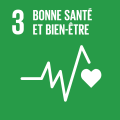
4 - Quality education
Guarantee quality education that is inclusive and equitable and foster opportunities for lifelong learning for everyone. Key issues: free-of-charge, equitable and quality education, access to higher education and training on an equal basis, education for sustainable development, suitable education centres for persons with disabilities, and safe, non-violent and efficient learning environments.
More information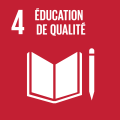
5 - Gender equality
Achieve gender equality and empower all women and young girls. Key issues: the end of all forms of discrimination and violence, recognition of unpaid care and domestic work, shared responsibility, equal opportunities, full and effective participation in reproductive rights, equal rights vis-à-vis economic resources, access to land and other assets and ownership.
More information